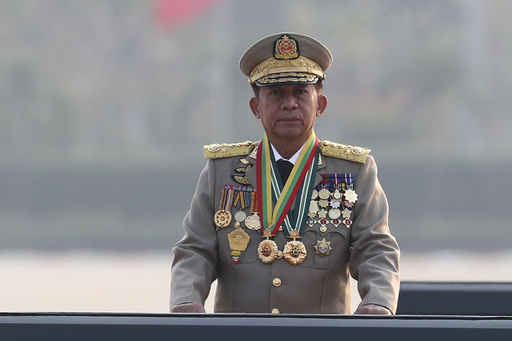
BANGKOK — This week, the leader of Myanmar’s military government, Senior General Min Aung Hlaing, is set to embark on an official visit to China, which is considered Myanmar’s most crucial international ally. His visit comes amid rising tensions and worries expressed by Myanmar’s opposition groups, according to reports from state-run media.
This trip marks Min Aung Hlaing’s first journey to China since the military coup in February 2021 that ousted the democratically elected government led by Aung San Suu Kyi. The timing of this visit raises eyebrows as Myanmar’s armed forces have faced significant setbacks on the battlefield in recent months, particularly in regions close to the Chinese border. The ruling generals of Myanmar, along with figures in China’s government, are reportedly anxious due to the increased momentum shown by pro-democracy guerrilla forces and armed ethnic groups that have banded together against military rule.
China is particularly wary of the instability in Myanmar, as it may threaten its strategic interests and investments in the country. Despite widespread condemnation from Western nations for human rights abuses following the military takeover, China has maintained a working relationship with Myanmar’s military leadership.
According to the state-run MRTV television, Min Aung Hlaing will be in the Chinese city of Kunming on Wednesday and Thursday. His agenda includes participation in three important summits focused on regional cooperation: the Greater Mekong Subregion summit, the Ayeyawady-Chao Phraya-Mekong Economic Cooperation Strategy, and cooperative efforts among Cambodia, Laos, Myanmar, and Vietnam. Kunming, located about 400 kilometers (approximately 250 miles) from the Myanmar border, serves as the meeting site.
Additionally, the general is expected to hold discussions with Chinese officials aimed at fostering goodwill and boosting economic ties between the two nations. China, alongside Russia, remains a key supplier of arms to Myanmar’s military engaged in ongoing conflicts against resistance groups. Furthermore, China is Myanmar’s largest trading partner, having invested significantly in various sectors, including mining and infrastructure.
Since assuming power, Min Aung Hlaing has only made one other international visit outside of Myanmar itself—to Russia. His participation in an ASEAN summit in April 2021 marked his only other presence on the international stage; due to noncooperation with efforts to peacefully resolve ongoing conflicts in Myanmar, he and his government officials have been barred from subsequent ASEAN gatherings.
Concerns from Myanmar’s pro-democracy opposition regarding this trip have surfaced, with Kyaw Zaw, a spokesperson for the National Unity Government, expressing his disquiet about China’s welcome of Min Aung Hlaing. In a recent video shared on Facebook, he urged the Chinese government to reconsider its invitation to the general. He emphasized that the people of Myanmar desire stability, peace, and economic development and criticized Min Aung Hlaing for undermining these goals. His remarks also pointed to the risk of misunderstanding within the public regarding the Chinese government’s intentions.
The opposition National Unity Government was formed by elected representatives who were prevented from assuming office in 2021 and maintains ties to the former ruling party of Suu Kyi. While there is widespread resentment towards China for its support of the military, the shadow government recognizes the need for cautious relations with Beijing owing to its significant influence in the area.
Since late last year, Myanmar’s military has found itself on the defensive, particularly due to substantial defeats inflicted by various ethnic armed groups in the northeastern part of the country. The “Three Brotherhood Alliance,” which includes the Myanmar National Democratic Alliance Army, the Arakan Army, and the Ta’ang National Liberation Army, has effectively captured towns and military bases, significantly impacting the military’s control over key regions close to the border with China. This offensive had previously seemed to benefit from tacit Chinese support aimed at addressing organized crime prevalent in areas dominated by ethnic Chinese.
In January, China facilitated a cease-fire agreement, but it collapsed in June as ethnic rebels resumed their attacks. Due to ongoing violence, China expressed its displeasure by restricting border crossings, cutting off electricity to certain towns in Myanmar, and implementing other measures aimed at discouraging continued hostilities.
